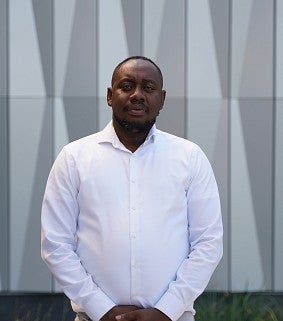
Revolutionizing brain disorder treatments through innovative neuroengineering
Felix Deku, Greg and Betsy Hatton Assistant Professor in Neuroengineering in the Department of Bioengineering at the Knight Campus, has been awarded an R01 grant from the National Institutes of Health (NIH) to support his innovative research in neuroengineering. The total expected amount of the award is roughly $2.2 million over three years, with $729,000 allocated each year. His project aims to develop scalable, ultra-small, microelectrode arrays — devices capable of recording brain activity over extended periods — which is a key step toward new treatments for brain disorders such as Parkinson’s disease. Such devices may also potentially restore motor function and communication in patients with conditions such as tetraplegia and locked-in syndrome.
Although there have been recent advances in the neurotechnology field, Deku says recording brain activity over long periods with microelectrode arrays still faces several challenges, one of the biggest being that the materials used in devices tend to break down over time. The result is weaker brain signals and fewer viable recording channels because of problems like the breakdown of protective coatings, corrosion of the electrodes, and failures in the connectors.
“The goal of this project is to develop microelectrodes using a much more stable material,” Deku said. “By improving the way we record brain activity with stable brain implants, we hope to better understand how the brain changes over time, which could ultimately lead to better treatments for neurological diseases.”
The project, “Scalable Fabrication of 128-channel Ultra-microelectrode Arrays for Long-Term Neural Recording,” earned the NIH R01, one of the most competitive grants in biomedical research. Deku’s lab will use the $2.2 million in funding to address significant challenges in the field, particularly the scalable production of devices that can transform the study of brain function and improve clinical treatments.
Deku’s innovative approach uses amorphous silicon carbide to build microelectrode arrays that record neural signals with minimal immune response. These ultra-small arrays can be implanted in the brain without the need for complex tools, potentially offering longer-lasting and clearer recordings than current technologies.
“This research has the potential to revolutionize how we study and treat neurological disorders,” Deku said. “We’re combining new materials with advanced microfabrication technology to solve one of the biggest challenges in neuroengineering: creating high channel count implants for chronic neural interfacing without sacrificing performance.”
The project includes extensive in vitro and in vivo testing to validate the device’s fabrication methods and long-term performance. By advancing the study of neural circuits, the research could improve treatments for a variety of neurological conditions.
“Professor Deku’s research reflects the spirit of innovation and discovery and the exciting trajectory of success among our Knight Campus Department of Bioengineering faculty,” said Danielle Benoit, Lorry Lokey Chair of the Department of Bioengineering at the Knight Campus.
— Oct. 23, 2024
